Evans Chebet Holds on to Win Men’s Race at the 2022 NYC Marathon
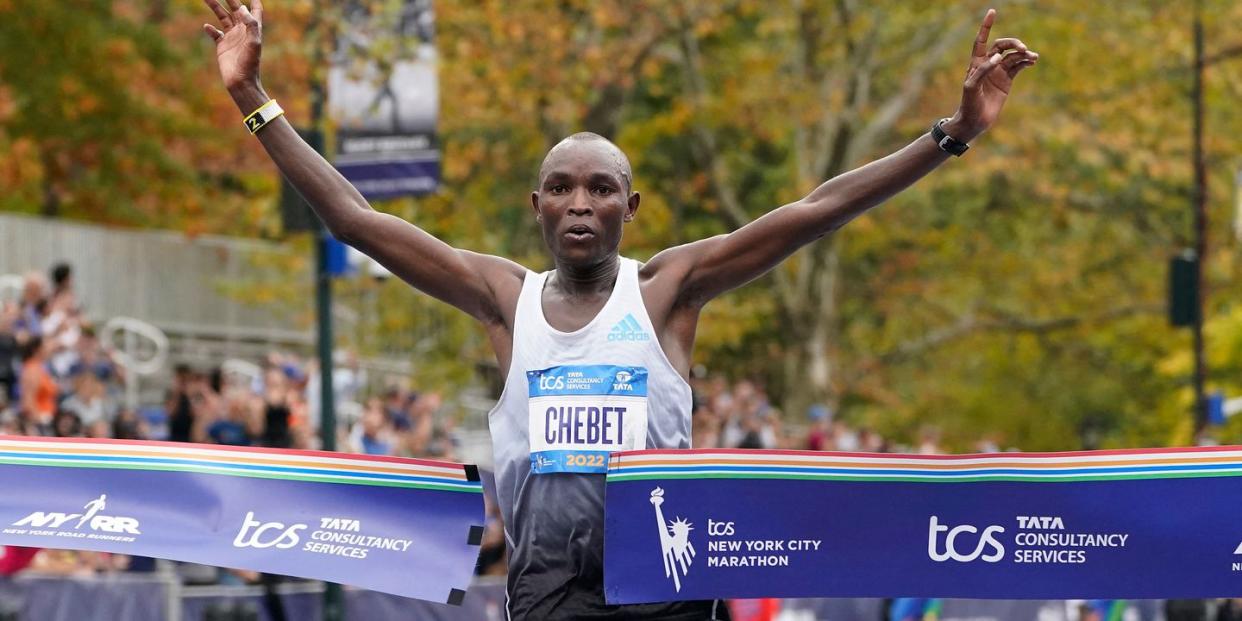
With the perfect mix of patience and aggression on a warm, humid morning, Evans Chebet of Kenya won today’s New York City Marathon in 2:08:41. Chebet, 33, also won the Boston Marathon in April, and is the first man to win both races in the same year since Geoffrey Mutai in 2011.
Shura Kitata of Ethiopia placed second in 2:08:54; he was also second here in 2018. Abdi Nageeye of the Netherlands, last year’s Olympic silver medalist, placed third in 2:10:31.
The weather played a huge role in today’s race. The temperature at the time of the first finisher, 72 degrees, was the highest since 1985, when the race was held on the last Sunday in October instead of the first Sunday in November. High humidity added to the challenge. An early sign of the tough conditions was how many elites, who have their own bottles available every 5K, grabbed cups of plain water in the first 15K to drink from and splash themselves with.
Scott Fauble was the top American, placing ninth in 2:13:35. Fauble was also the top U.S. finisher at Boston in April. Reed Fischer was the second U.S. finisher, placing 10th in 2:15:23. Olympian Jared Ward, 11th in 2:17:09, was the third American.
Here’s a full breakdown of the 2022 New York City Marathon men’s race, from the biggest surprises to where the race was won.
The Winner: Evans Chebet
On paper, Chebet’s win isn’t surprising. He won Boston in April, and his personal best of 2:03:00 is the fastest in the field and makes him the seventh fastest man in history on a record-eligible course. Before today, he had finished first or second in 11 marathons.
And yet, Chebet wasn’t necessarily a clear favorite on the challenging New York City course. His fast times have come at flat, time-trial-like races. Boston, of course, has its hills, but Chebet’s win there was after a relatively moderate first 20 miles by the lead pack. It wasn’t a given that Chebet would reign supreme in his first go in New York. (Indeed, he occasionally seemed taken aback by road conditions. On the Queensboro Bridge, Chebet briefly ran quasi-serpentine to navigate potholes and patched asphalt.)
Chebet has had a stellar year, individually and as a member of 2 Running Club, one of the world’s strongest marathon training groups. In the last four weeks, club members have won the men’s race at London (Amos Kipruto) and Chicago (Benson Kipruto).
Where the Race Was Won
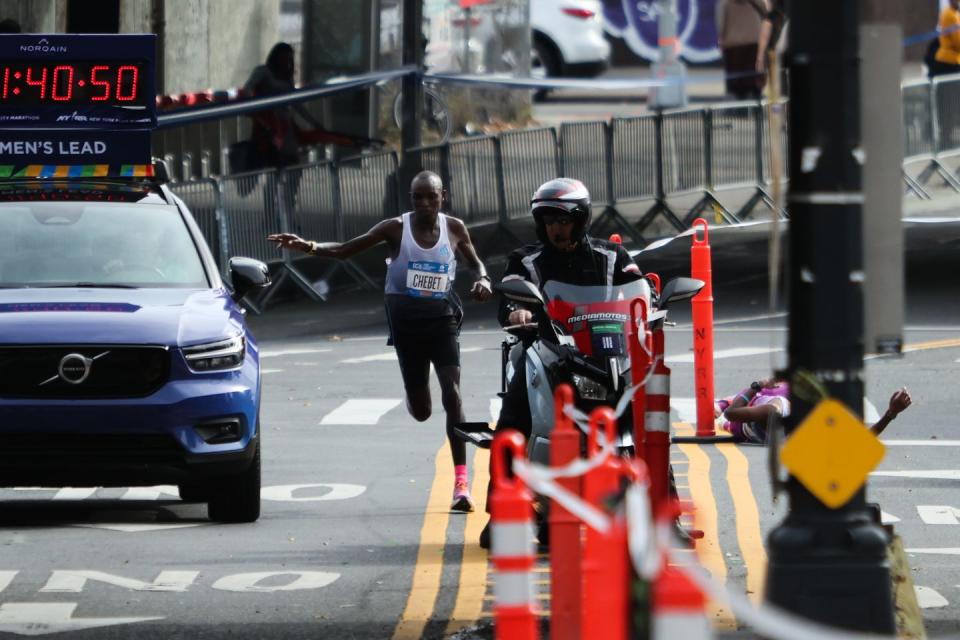
Chebet’s win was a two-step process. First, he separated himself from the chase pack that spent the first half of the race wondering how far ahead early leader Daniel do Nascimento was. Then, he ran down do Nascimento, a task made easier by the Brazilian crumpling to the asphalt in the 21st mile. (See “The Biggest Surprise of the Race” below.)
Phase one occurred on the Queensboro Bridge. Chebet pushed on an uphill stretch in the 16th mile. The pack, which had occasionally split and then regrouped in the previous five miles, disintegrated for good. Chebet was solo in second as he ran off the bridge on to First Avenue in Manhattan.
Phase two felt inevitable. Chebet was speeding up while do Nascimento was struggling and appearing closer and closer to his pursuer. Then the Brazilian collapsed. Through a translator, Chebet said that when he ran past do Nascimento, he felt bad for his rival, but that he needed to focus on his own race.
Behind Chebet, the trio of Shura Kitata, Abdi Nageeye, and Mohamed El Aaraby ran together through 20 miles. They were 28 seconds behind Chebet. Kitata then struck out after Chebet, whose form was starting to falter after his strong push to take the lead. Kitata cut Chebet’s lead to 16 seconds by 35K (21.7 miles), then to 11 seconds by 40K.
But Kitata wasn’t able to keep advancing. “It was very hot and that made it very tough,” he said through a translator after the race. Chebet held that 70-or-s0-meter lead to the finish.
How the Americans Did
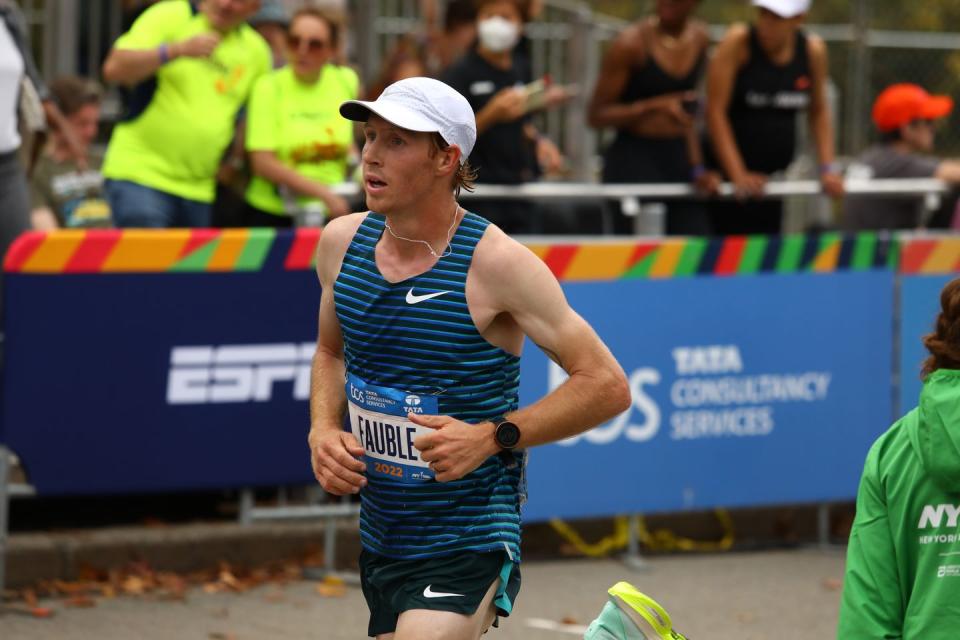
It was neither an amazing nor disastrous day for the pro American men. Two finished in the top 10 against a deep international field. On the other hand, there were three Americans in the top 10 last year, and top seed Galen Rupp dropped out before 30K after being the only American to run with the chase pack through halfway. (Rupp’s agent, Ricky Simms, told Runner’s World that Rupp suffered a hip injury.)
Top U.S. finisher Scott Fauble continued to quietly build a solid résumé. He now has four top-10 finishes at World Marathon Majors races and a 2:08:52 personal best, set when he placed seventh (and top American) at Boston in April.
Fauble said after the race that a steady, conservative effort was the right approach for him, especially considering the weather. “It would be a horrible mistake” is how he characterized the hypothetical of sticking with the early chase pack, from which winner Chebet emerged.
At the 10K mark, Fauble said, he tried to rally the American runners around him, including eventual 10th-place finisher Reed Fischer. “We’re not chasing,” Fauble told the others. “Those guys are coming back to us. We’re not going to them.”
Fauble’s prediction came true, at least for himself. Sixteenth at halfway (and behind five other Americans at that point), he moved up to 13th by 25K, 11th at 30K, and 10th (and top American) by 20 miles. He caught one more runner before the finish.
Fauble had an excellent weekend on the financial front. He won $27,500 in prize money—$25,000 for being first American and $2,500 for placing ninth overall—and on Saturday night finalized a sponsorship deal with Nike.
The Top 10
Evans Chebet, Kenya, 2:08:41
Shura Kitata, Ethiopia, 2:08:54
Abdi Nageeye, Netherlands, 2:10:31
Mohamed El Aaraby, Morocco, 2:11:00
Suguru Osako, Japan, 2:11:31
Tetsuya Yoroizaka, Japan, 2:12:12
Albert Korir, Kenya, 2:13:27
Daniele Meucci, Italy, 2:13:29
Scott Fauble, U.S., 2:13:35
Reed Fischer, U.S., 2:15:23
The Biggest Surprise of the Race
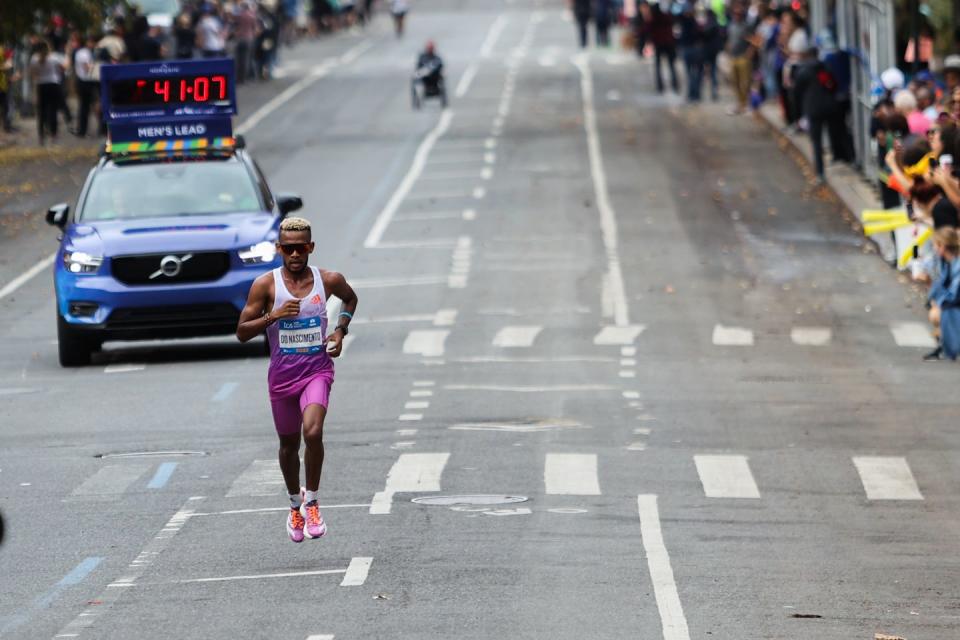
Not to pick on a guy when he’s down (literally), but what was early leader Daniel do Nascimento of Brazil thinking?
With a 2:04:51 personal best, the fastest in history for someone not born in Africa, do Nascimento obviously knows his way around a marathon. But today—on the most difficult course of the World Marathon Majors, on a warm, humid morning—he ran with the recklessness of a novice.
He passed 5K in 14:31, already 29 seconds ahead of the chase pack. Rather than settling in, he accelerated, covering the second 5K in 14:11. His 10K time, 28:42, projects to a 2:01:01 finish. (Eliud Kipchoge’s world record is 2:01:09.) His halfway split of 1:01:22 appears to be the fastest first half in race history. It was almost two minutes faster than Geoffrey Mutai’s first half when Mutai set the course record of 2:05:06 in 2011, and it put him more than two minutes up on the chase pack.
Reality caught up to do Nascimento gradually, then suddenly. Past halfway, he started to slump a little to the right. His arm action increased while the pop in his stride decreased. His split between 20K and 25K was only six seconds faster than Chebet’s. He took a few glances behind on the long stretch of First Avenue before 30K.
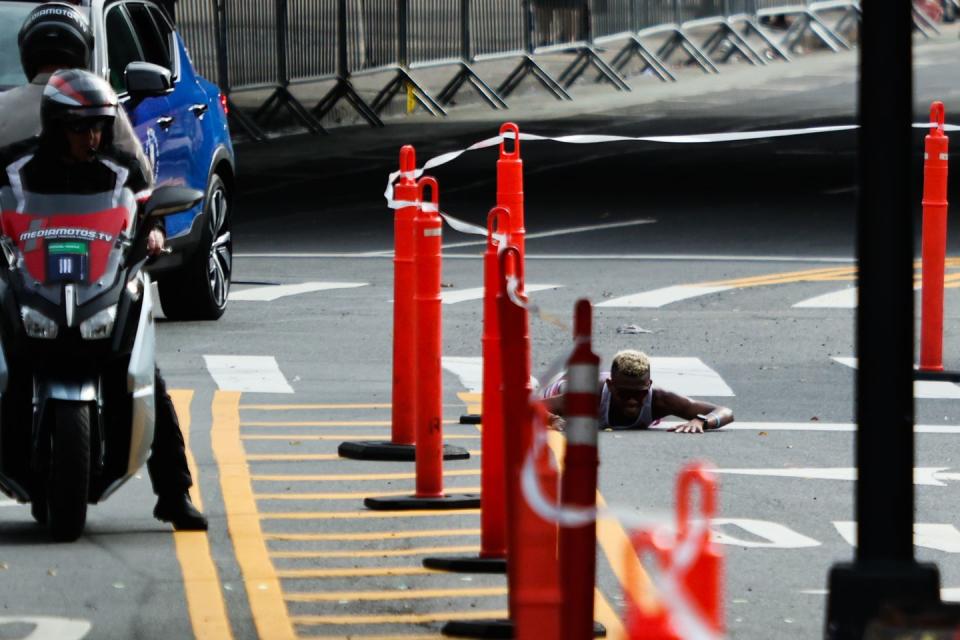
Then came the one-two punch. Just after the 18-mile mark, do Nascimento ducked into a portable toilet. (He emerged an impressive 20 seconds later.) Counting the stop, he covered from 25K to 30K in 15:41; Chebet, meanwhile, clocked 14:37 for that stretch, which can be among the fastest parts of the course if you’re relatively fresh.
The knockout came 10 minutes later. On a slight uphill in the 21st mile, do Nascimento wilted, grabbed his left quad, and collapsed under a course barrier into almost a fetal position. He was tended to by race personnel after stopping, but was not taken to a hospital and, according to a race official, was fine a few hours later.
The Prize Money
1st place: Evans Chebet, $100,000
2nd place: Shura Kitata, $60,000
3rd place: Abdi Nageeye, $40,000
Top American: Scott Fauble, $27,500 ($25,000 for first American, $2,500 for ninth overall)
What We’ll Remember
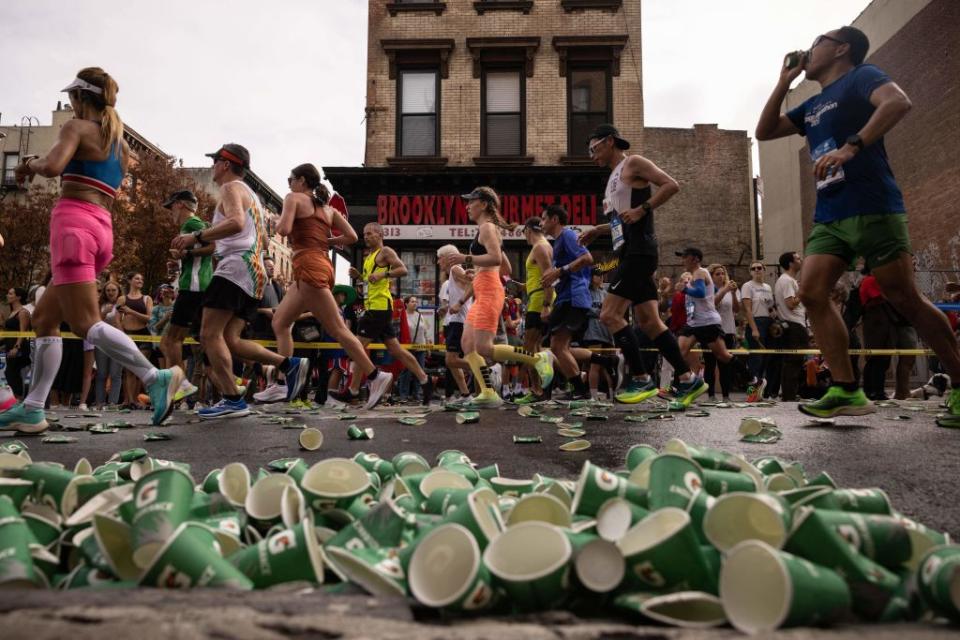
Oh, the humanity! As in, the severe slowing over the second half, not to mention early leader do Nascimento’s collapse, is a reminder that even the best runners in the world are mortal.
Of the top ten men, only the first two finishers, Chebet and Kitara, covered the final stretch from 40K to the finish faster than women’s winner Sharon Lokedi. That was a direct result of the early fast pace on the warmest marathon day in New York since 1985.
The lesson, for the next time you find yourself at an unexpectedly warm, humid race: Run well within yourself if your goal is more time- than place-based. If elite marathoners can’t outrun the effects of dehydration, then neither can the rest of us.
You Might Also Like
